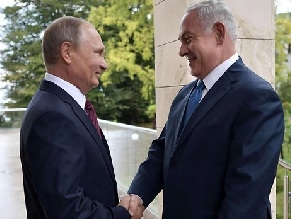|
Analytics

Russian President Vladimir Putin and Prime Minister Benjamin Netanyahu (Photo: AFP)
|
Russia-Israel crisis deepens after latest IAF strike in Syria
01.11.2018, Israel and the World Moscow was raging mad and the Russian liaison officers at the Hmeimim base in Syria were furious with their Israeli counterparts after the IAF's recent attack in Syria, which was confirmed this week by a source in Jerusalem. The source sought to show Israeli determination and put on a false display of the IDF resuming normal activity in Syria against Iranian targets. But the story behind this aerial attack shows the extent of the crisis between Russia and Israel, which began with the downing of a Russian spy plane, and to which no solution has been found so far.
According to reports on social media in the Middle East, where users monitor military activity in Syria, the Israeli air strike took place more than a month ago, after Russia blamed Israel for the deaths of 15 air crew and intelligence personnel aboard the intelligence plane, which was shot down by Syrian aerial defense.
It's safe to assume that the attack was aimed at testing the Russian response in an attempt to assess the extent of the crisis between Moscow and Jerusalem. The attack was carried out in daylight, and the Russians were given early warning. This time, too, the Syrians fired anti-aircraft missiles in all directions.
The Russians did not let the attack go unanswered and conveyed strong protest through the Russian-Israeli military liaison system. The only thing Israel could take comfort in is the fact the Russians chose not to make the attack public, which would've just further exacerbated the crisis. Even the latest Israeli leak, about a month after the attack, did not warrant a public response from the Russian or Syrian governments. In the Russian media, the Israeli report was not given much airtime or attention.
Israeli defense sources claim that this crisis continues because the Russians are trying to impose new rules of coordination on Israel that could severely limit the effectiveness of Israeli attacks in Syria. Israel is not yet ready to fully comply with Russian coordination demands, as this would pose an unreasonable risk to the IAF fighter jets, while operational information could leak to the Iranians and Syrians.
On Wednesday, Russian Defense Ministry spokesman Igor Konashenkov briefed journalists in Moscow on the preparations being made in Syria to begin using the S-300 missile batteries, which Russia gave the Syrian army. Among other things, he said—without explicitly mentioning Israel's name—"This system is a warning to all the hotheads in the region."
Since the Russian plane was shot down a month and a half ago, there has been a complete disconnect between the Russian defense minister, Sergey Shoygu, and the Israeli defense minister, Avigdor Lieberman. The close personal ties between the two, created over the past few years and used as a regular channel of communication between the two defense establishments, were severed.
Furthermore, all attempts by the Prime Minister's Office to schedule a meeting with Russian President Putin have gone unanswered by the Kremlin. During his stay in New York last month, Netanyahu announced that upon his return to Israel he would meet posthaste with President Putin in order to resolve the crisis. Five weeks have passed since, and Putin is not picking up the phone.
The disconnect between the Israeli and Russian political leaderships makes it difficult to solve fundamental problems. For example, Israel has reservations about the Russians' commitment to keep the Iranians dozens of kilometers from the Golan Heights. In practice, there are Iranians integrated into Syrian army units stationed on the Syrian Golan, not far from the Israel border. In the current state, Israel finds it difficult to persuade the Russians to fulfill their commitment.
Even the leaks from the Prime Minister's Office about preparations being made for a meeting with Putin in Paris on November 11 seem premature. Russian presidential spokesman Dmitry Peskov said Tuesday that the only planned meeting in Paris is between President Putin and US President Trump, when heads of state will meet to commemorate 100 years since the end of World War I. Peskov explained to journalists that "Putin is scheduled to attend memorial events, so he will have an opportunity to hold brief conversations with other participants, including Netanyahu."
Israeli officials claim that the Israeli policy to sabotage any Iranian incursion into Syrian territory and disrupt any attempt to smuggle Iranian weapons from Syria to Hezbollah in Lebanon, is continuing as usual. To that end, the Israeli officials say, many operations are carried out. But it is doubtful these operations continue at the same rate they did before the Russian spy plane was shot down.
By Alex Fishman
Ynet
|
|
